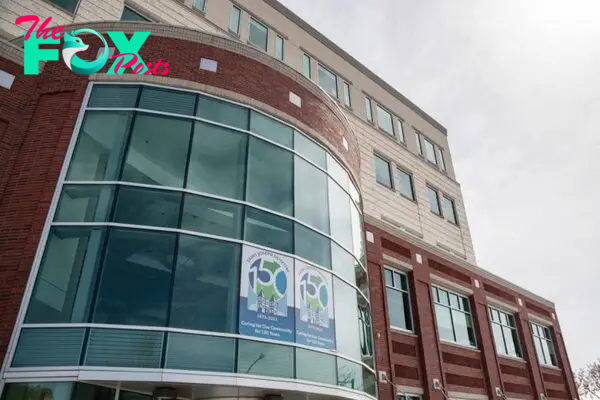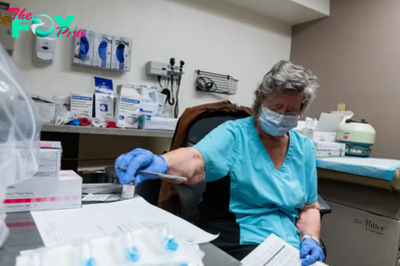Health
Colorado eating disorder patients say they’ve been subjected to nude weigh-ins, forced to eat non-vegan foods
Reese Chism had marks on her wrists from the restraints used to pin her down for blood draws.
She still has nightmares about being forced to stand naked in front of other girls for weigh-ins. The teenager said she threw up because staff made her drink milk and eat cheese, even though she told them she was lactose intolerant.
Chism, now 16, attended a day program at an eating disorder treatment center in Colorado for just three days last summer before her parents yanked her out, concerned that it was hurting her more than helping. “They started noticing something wasn’t right,” she said. “My parents were in classes at the facility and they basically train your parents not to believe you.”
The Denver teen is now among those asking Colorado to regulate eating disorder clinics, ensuring they provide so-called trauma-informed care. That includes not watching patients as they shower or forcing them to eat foods they are ethically opposed to eating, including meat, according to legislation under consideration at the state Capitol.
Chism does not want to name the facility where she received treatment. Her parents enrolled her in the day program after Chism’s eating disorder had gotten so dire that she had lost 40 pounds and was eating just 800 calories per day — the amount recommended for a toddler.
At the center, she said two male staff members held her down and told her she would get a feeding tube if she didn’t eat the rest of her meal. “I was sobbing and I was really scared,” Chism told The Sun. “They thought I was going to fight back against them.
“I was 15 years old and 5-foot-1.”
While Colorado is a national hub for eating disorder treatment, the state does not regulate centers’ treatment plans or clinical practices. The clinics are regulated only by the Colorado Department of Public Health and Environment, which performs safety inspections and investigates complaints. The legislation from state Sens. Lisa Cutter and Faith Winter, both Democrats, would put the clinics under the purview of the state Behavioral Health Administration, which oversees mental health hospitals.
Eating disorders are the second-deadliest mental health condition, after opioid abuse. From 2018 to 2022, health insurance claims for eating disorders rose 65% nationally, with the largest increase in those ages 14-18.
“Yet there are few laws and regulations in place to address this type of treatment and protections people would expect while receiving care here in Colorado,” Cutter said during a hearing on the legislation, which passed out of a Senate committee 6-3. “This bill would recognize that people with eating disorders have a mental health condition and should be in facilities regulated by agencies with expertise in mental health.”
Cutter tried to pass a similar bill last year, but the legislation was stripped of the regulation requirement for budgetary reasons. This year’s bill calls for $460,533 next year to set up the program.
Instead, the legislature passed a bill in 2023 that prohibited insurance companies and treatment facilities from using a person’s BMI, or body mass index, to determine whether to cover eating disorder treatment. It also prohibited the sale of some diet pills to minors.
Should Colorado ban doctors from forcing vegans to eat animal products?
A huge point of controversy in this year’s proposal — and one that divided the Senate Committee on Health and Human Services — is whether eating disorder treatment facilities should be allowed to force patients to eat certain foods.
Former patients of eating disorder centers said they had been forced to eat dairy products and eggs even though they are vegan.
“I believe that ignoring deeply held personal convictions, and dietary restrictions, could have a significant impact on someone’s mental health,” said Cutter, of Jefferson County. “We all have different things that we hold deeply. Am I to tell any of you that your religious conviction doesn’t matter?”
Sen. Kyle Mullica, a Federal Heights Democrat and an emergency room nurse, disagreed with the ethical diet clause in the bill, as did several medical and behavioral health staff who work with patients with eating disorders. They argued that it’s sometimes necessary to require people to eat all kinds of foods so they don’t die.
“The goal of these providers is to save lives — it’s not to try to traumatize by any means,” Mullica said. “We need to be really careful when it comes to not allowing physicians and providers to be able to do the job that they have been trained for years, and sometimes decades, to do.”

Several clinicians from the Eating Recovery Center, which receives 85% of its patients from out of state, said it’s difficult to untangle the reasons why patients won’t eat certain foods. Often, it’s part of the disorder.
Anne Marie O’Melia, chief clinical officer for the Eating Recovery Center, said the center tries to accommodate dietary requests when it’s safe. The problem is that some of the same foods that help people gain weight, such as dairy products and eggs, are the ones patients say they will not eat, which makes it difficult to accommodate veganism, she said.
-

 Health20h ago
Health20h agoTeens Are Stuck on Their Screens. Here’s How to Protect Them
-

 Health1d ago
Health1d agoHow Pulmonary Rehab Can Help Improve Asthma Symptoms
-

 Health1d ago
Health1d ago10 Things to Say When Someone Asks Why You’re Still Single
-

 Health2d ago
Health2d agoThe Surprising Benefits of Talking Out Loud to Yourself
-

 Health2d ago
Health2d agoDoctor’s bills often come with sticker shock for patients − but health insurance could be reinvented to provide costs upfront
-

 Health2d ago
Health2d agoWhat an HPV Diagnosis Really Means
-

 Health3d ago
Health3d agoThere’s an E. Coli Outbreak in Organic Carrots
-

 Health4d ago
Health4d agoCOVID-19’s Surprising Effect on Cancer


























